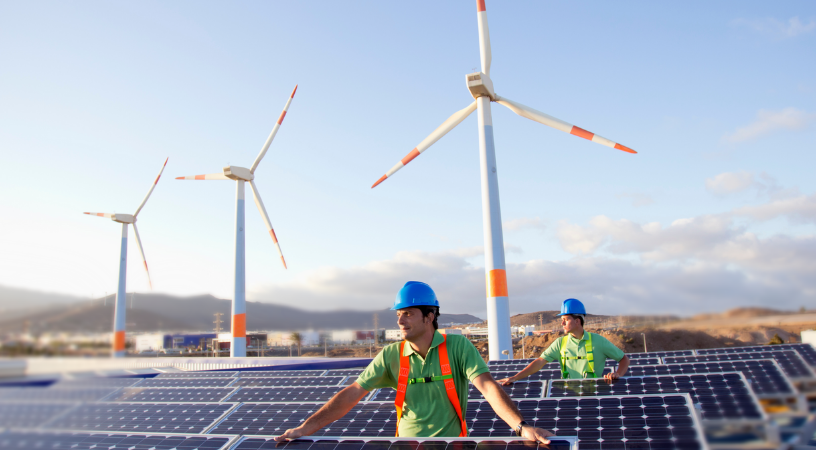Choosing Green Venues
Energy and Water Efficiency in Sustainable Event Spaces
Are you a venue operator looking for more information on sustainability?
When events adopt sustainability goals such as reducing water and energy, they’re then tasked with finding host venues that have the systems in place to support such goals. We’ve compiled this guide for event planners on what to look for and which questions to ask when reviewing spaces for sustainability.
1. Certifications
Sustainability certifications show that the building’s operations and infrastructure have been reviewed and approved by an established third-party authority. They are a great shorthand way to know if a venue values– and has pursued– sustainability-related improvements. Certifications to look for include:
Additional certifications that can indicate more specific areas of focus include:
For any of these standards, ask for the venue to provide the certification scorecard or other records indicating how it impacts energy and water consumption at the venue.
2. Water Conservation Plan and Energy Management Policy
Ask to read the building’s environmental operations policies. Having formal company policies demonstrates commitment to improvement and establishes operational responsibility. Plans should be signed by Executive Management for accountability and legitimacy. There may be elements in their policies that you’ll need to communicate to your exhibitors or GSC such as reduced HVAC during move-in and move-out. Look for specific ways in which the plan addresses operational, administrative, and event consumption of the identified resource, and consider all aspects of building operations. While as many as 80% of companies now report having carbon reduction strategies, they risk greenwashing without executive support and an action plan for follow-through, so make sure to ask about follow-through on the policies.
3. Renewable Energy
Any venue that produces onsite energy through solar or wind installations should be above and beyond a preferred space for sustainable events. Not only can energy bills be reduced as a result of their in-house energy farm, but your carbon footprint will be smaller, resulting in less environmental impact and less cost for equivalent offsets, if your event purchases those.
Other ways that buildings can tap into renewable energy are through the purchase of RECs, or Renewable Energy Credits, which also demonstrate the building’s investment in renewables.
4. Infrastructure and Equipment
Ask about improvements to electrical and plumbing equipment to more efficient models. Look for Water Sense and EUWL labels for water efficiency and Energy Star certified for vetted electric appliances. Small adjustments in efficiency can result in large cost savings, which may be passed on to the event organizers via reduced utility bills. Replacing just one urinal with a WaterSense labeled model could save a facility more than 4,600 gallons of water per year and associated costs.
In addition, the venue should be submetered and able to provide energy and water consumption data for any event divided by date, time and occupied space. This can be especially important for very large venues and/or smaller events that may be running concurrently with other rentals. Use this utility data to measure the impact of your event year-over-year in order to strategize ways to reduce the energy and water use that your event controls.
5. Outdoor Spaces
Even if your primary event will take place indoors, the use of outdoor space can say a lot about the sustainability of a venue. Look for some of these environmentally friendly ways to use outdoor areas:
Do outdoor areas include green space like rooftops, plazas, and gardens?
In those spaces, inquire about native landscaping. By following nature’s lead, native plants may not require much irrigation, and therefore reduce water use.
Does the venue have stormwater capture for irrigation or other reuse? Even without reuse, swales and planters designed for infiltration can reduce pollution in runoff coming from impervious surfaces such as roads and walkways around the building, and can reduce nuisances like flooded areas.
Does the building grow anything for use in its catering or kitchens, such as vegetables or herbs? Or, does it use any composting from building facilities to nourish its green spaces? Hyper local circularity reduces many impacts including landfill waste, transportation costs, and consequences from packaging and procurement.
6. Connect with their Green Team
Ask about coordinating with the venue’s sustainability team, manager or consultant. This person or team should be primed to coordinate with you on sustainability requests by connecting you with the departments and teams that handle such things on the building side. By working with the building’s existing sustainability infrastructure, you can streamline the processes you’re putting in place to meet your event’s sustainability goals.
The venue’s team should also be able to help you with your tracking and reporting. Ideally the team is already reporting data in a dashboard or process of its own. Ask if this data can be exported, or talk to them early about participating in the data tracking system that you’re implementing for your event. Getting their buy-in will be essential to obtaining timely and accurate metrics after the fact.
Vet properties for their efficiency and infrastructure to greatly improve your event’s chances at meeting sustainability goals. You can enhance your planning, reduce costs, and access reliable reporting after the event. Once you’ve made your venue decision, start your conversations with partners early to coordinate on requests and communicate expectations and processes for sustainability. Both event planners and venue hosts will reap the benefits of an informed relationship between parties interested in sustainable goals.




